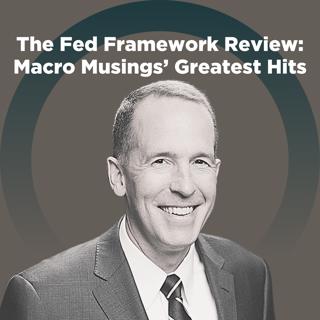
17 - Brad DeLong on Hamiltonian Political Economy and American Economic History
J. Bradford DeLong – professor of economics at UC-Berkeley, research associate at the National Bureau of Economic Research, and a deputy assistant secretary of the U.S. Treasury during Bill Clinton’s presidency – joins the show to discuss his new book, “Concrete Economics: The Hamilton Approach to Economic Growth and Policy.” Brad’s book, co-authored with Stephen Cohen, argues that rather than relying on abstract theory, Hamilton economics is based on facts that demonstrate how the American economy has benefited from pragmatic government policies throughout its history. David and Brad also discuss Brad’s education at Harvard and how he is a “speed reader”! David’s blog: http://macromarketmusings.blogspot.com/ Brad DeLong’s blog: http://delong.typepad.com/ Brad DeLong’s UC Berkeley profile https://www.econ.berkeley.edu/faculty/812 David’s Twitter: @DavidBeckworth Brad DeLong’s Twitter: @DeLong Related links "Concrete Economics: The Hamilton Approach to Economic Growth and Policy (2016)" by Stephen S. Cohen and J. Bradford DeLong https://www.amazon.com/Concrete-Economics-Hamilton-Approach-Economic/dp/1422189813 "The End of Influence: What Happens When Other Countries Have the Money" by Stephen S. Cohen and J. Bradford DeLong (2010) https://www.amazon.com/End-Influence-Happens-Other-Countries/dp/B004MKLS28 Brad DeLong’s Journal of Economics article, “The Triumph of Monetarism?” (2000) https://www.aeaweb.org/articles?id=10.1257/jep.14.1.83
1 Aug 201646min

16 - David Andolfatto on Life at the Fed, Equity-Based Finance, and the Blockchain
David Andolfatto is a vice president of the St. Louis Federal Reserve Bank and a professor of economics at Simon Fraser University. He joins the show to discuss life at the St. Louis Fed, equity-based finance as a means of averting financial crises, and challenges in using monetary policy to drive nominal growth. Finally, David also clarifies some of the misconceptions surrounding Blockchain technology and explains what this technology may mean for Federal Reserve policy. David Beckworth’s Twitter: @davidbeckworth David Beckworth’s Blog: http://macromarketmusings.blogspot.com/ David Andolfatto’s Twitter: @dandolfa David Andolfatto’s Blog: http://andolfatto.blogspot.com/ Related links The Diamond-Dybvig Model on bank runs: https://www.macroeconomics.tu-berlin.de/fileadmin/fg124/financial_crises/literature/Diamon_Dybvig_Bank_Runs__Deposit_Insurance__and_Liquidity.pdf David Andolfatto on “A Dirty Little Secret” about monetary policy: http://andolfatto.blogspot.com/2014/11/a-dirty-little-secret.html
25 Juli 201659min

15 - Robert Hall on GDP Measurement and the Long Slump
Robert Hall, professor of economics at Stanford University and senior fellow at the Hoover Institution, has written on macroeconomic issues since the 1960s. Bob is also the chairman of the National Bureau of Economic Research’s Committee on Business Cycle Dating, which maintains the chronology of U.S. business cycles. He joins the show to discuss the difficulties of measuring gross domestic product and dating the beginning and end of recessions. David and Bob also talk about the pros and cons of nominal GDP targeting and price level targeting. Finally, Bob shares his thoughts on why our economy has performed so lethargically since the Great Recession. David’s Twitter: @davidbeckworth David’s blog: http://macromarketmusings.blogspot.com/ Keywords: interview, macroeconomics, Federal Reserve, Great Stagnation, GDP Related links: Robert Hall’s bio: http://stanford.edu/~rehall/ Robert Hall's list of publications: http://www.stanford.edu/~rehall/All_publications.htm Robert Hall and Gregory Mankiw on nominal GDP targeting: http://www.stanford.edu/~rehall/Nominal%20Income%20Targeting%201994.pdf (Photo Credit: Peter Tenzer)
18 Juli 20161h 4min

14 - Mark Thoma on Fiscal Policy, Econometrics, and Political Business Cycles
In this week’s episode, David speaks with Mark Thoma, professor of economics at the University of Oregon and author of the popular blog, “Economist’s View.” Mark discusses his journey into econometrics and the application of econometric techniques to macroeconomic and monetary issues. Looking back at the 2008 crisis, Mark makes the case that fiscal stimulus should have been much stronger. He and David also discuss the role of monetary policy and financial regulation during this time. Finally, Thoma also explains some of his work on political business cycles: instances where politicians affect policy to increase the likelihood of being reelected. David’s blog: http://macromarketmusings.blogspot.com/ Mark Thoma’s blog: http://economistsview.typepad.com/ David’s Twitter: @DavidBeckworth Mark Thoma’s Twitter: @MarkThoma Related links Mark Thoma’s Webpage: http://pages.uoregon.edu/mthoma/ Mark Thoma’s CBS archive: http://www.cbsnews.com/search/author/mark-thoma/ Mark Thoma’s Fiscal Times archive: http://www.thefiscaltimes.com/Authors/T/Mark-Thoma David’s first blog post: http://macromarketmusings.blogspot.com/2007/08/liquidityholics-of-world.html Timestamps (00:00:00) - Intro (00:00:21) - Episode start (01:00:19) - Outro
11 Juli 20161h

13 - Joseph Gagnon on Quantitative Easing in the United States and Abroad
As a Federal Reserve official, Joseph Gagnon played a critical role in providing the intellectual justification for the Fed’s quantitative easing (QE) programs. Now a senior fellow at the Peterson Institute for International Economics, Joe joins the show to discuss the events leading up to the decision to implement QE and its consequences. He and David also discuss how the Fed’s QE compares and contrasts with the QE implemented by the Bank of Japan and the European Central Bank. Finally, Joe shares some of his thoughts on Brexit’s wider implications. David’s blog: http://macromarketmusings.blogspot.com/ Joseph Gagnon’s biography: https://piie.com/experts/senior-research-staff/joseph-e-gagnon David’s Twitter: @DavidBeckworth Joseph Gagnon’s Twitter: @GagnonMacro Note: this recording was taped before the Brexit vote on June 23. Related Links “Large-Scale Asset Purchases by the Federal Reserve: Did They Work?” https://www.newyorkfed.org/medialibrary/media/research/staff_reports/sr441.pdf “Quantitative Easing: An Underappreciated Success” https://piie.com/system/files/documents/pb16-4.pdf
4 Juli 201656min

12 - Will Luther on Bitcoin, Vodka, and the Emergence of Money
What is money and where does it come from? Will Luther, assistant professor of economics at Kenyon College, joins the show and explains the two competing theories on the origins of money. The first theory posits governments are needed to provide credibility for money as a medium of exchange. The second theory, the spontaneous order theory, argues market actors will arrive at an acceptable medium of exchange on their own. David and Will discuss historic examples of both public and private money, including the Somali shilling and the brief use of vodka as a form of currency in Russia in the 1990s. Will also explains how Bitcoin and other forms of cryptocurrency work and how cryptocurrency may affect future macroeconomic policy. David’s blog: http://macromarketmusings.blogspot.com/ Will Luther’s webpage: http://www.wluther.com/ David’s Twitter: @DavidBeckworth Will Luther’s Twitter: @WilliamJLuther Related links: “Synthesizing State and Spontaneous Order Theories of Money” http://papers.ssrn.com/sol3/papers.cfm?abstract_id=2140208 “The Monetary Mechanism of Stateless Somalia” http://papers.ssrn.com/sol3/papers.cfm?abstract_id=2047494 “Regulating Bitcoin: On What Grounds?” http://papers.ssrn.com/sol3/papers.cfm?abstract_id=2631307 “On the Origins of Money” https://mises.org/library/origins-money-0
27 Juni 201654min

11 - Robert Hetzel on Milton Friedman, the Monetarist-Keynesian Debate, and the 2008 Crisis
Robert Hetzel is a senior economist and research advisor at the Richmond Federal Reserve Bank where he has worked since 1975. He joins the show to discuss the rise of monetarism and how Milton Friedman, his dissertation advisor, shaped his thinking on macroeconomics. Monetarism challenged the conventional Keynesian consensus in the 1970s and caused Keynesians to reformulate their views into a new doctrine called, “New Keynesianism.” However, in the wake of the Great Recession, “Old Keynesianism” has made a comeback. Hetzel pushes back against the Keynesian resurgence and explores other explanations of the 2008 crisis. David's blog: http://macromarketmusings.blogspot.com/ David's Twitter: https://twitter.com/DavidBeckworth Robert Hetzel's biography: https://www.richmondfed.org/research/economists/bios/hetzel_bio Related links: https://www.richmondfed.org/~/media/richmondfedorg/publications/research/economic_quarterly/2012/q2/pdf/hetzel.pdf https://www.richmondfed.org/~/media/richmondfedorg/publications/research/economic_quarterly/2009/spring/pdf/hetzel2.pdf https://www.amazon.com/Program-Monetary-Stability-Milton-Friedman/dp/0823203719
20 Juni 201654min

10 - Lars Christensen on the Eurozone Crisis and International Monetary Policy
Lars Christensen, an internationally renowned Danish economist and Senior Fellow at London’s Adam Smith Institute, discusses the poor monetary policy that has plagued the Eurozone. Christensen, the coiner of the term “market monetarism,” argues that Europe from the beginning was not an optimal region for its members to share a single currency and that the European Central Bank’s decisions have greatly worsened the Eurozone’s economic pain. This suffering, consequently, has led to the rise of extremist movements throughout the region. Lars and David also turn their conversation to the lesser-known “dollar bloc,” the group of countries that either use the U.S. dollar or peg their currencies to the dollar. David's blog: macromarketmusings.blogspot.com Lars Christensen’s blog: https://marketmonetarist.com David’s Twitter: https://twitter.com/DavidBeckworth Lars Christensen’s Twitter: https://twitter.com/MaMoMVPY
13 Juni 201657min






















